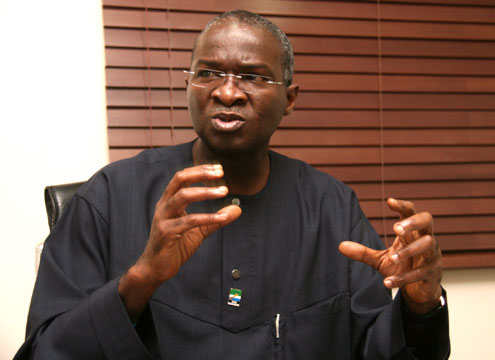In my earlier publication titled “Power Sector: the Great Expectations from Fashola” I did capture the point that Babatunde Raji Fashola has the right leadership quality to drive the power sector to success. In that piece I opined that this leadership quality would certainly show in his conduct of business and performance in the upcoming days.
Emerging developments within the power sector since his inauguration as the Minister of Power, Works and Housing on the 11th of November 2015 have clearly vindicated this assertion. Not only has Fashola firmly established himself as the sector leader by setting his agenda, he has also demonstrated in-depth knowledge of the sector’s issues and challenges. Those who were privileged to listen to his inaugural media briefing titled “Setting Agenda for Delivering Change” will not agree less with my position. At that briefing, the Minister while defining his agenda affirmed and I quote “predictable, stable, and ultimately uninterrupted power supply will be a critical and defining component of our economic renaissance…”. He appreciated the enormous responsibilities that go with this task and summarized by stating that “he would continue trying to understand where things stand, where the problems are, what can be solved, what cannot be solved, what must continue and what must be altered”.
True to his words, he has remained focused on this task and all his actions have been milestone and activity driven. In few days from now, precisely on the 1st of February 2016, a new tariff in the electricity billing will be introduced by the Nigerian Electricity Regulatory Commission (NERC). Although this has been a contentious matter due to the resistance from the general public, the Minister has been able to appeal for understanding of issues surrounding the new Tariff. In his appeal for the acceptance of the new tariff, the Minister stated “I know that it has been a contentious matter, but I make this fervent appeal to consumers to give us the benefit of doubt, to forbear and accept it”. He adduced two major reasons why the public should accept the new tariff. The first reason is that public acceptance of the tariff would help government to maintain its credibility with investors. The second reason is that the surest way not to have power would be to oppose the implementation of the new tariff order.
What is important here is, let there be light. I believe that once there is light, the public will pay for it. Once this is achieved, Nigerians will be optimistic that like the per minute and per second billing issue in telecommunication, the electricity market will plateau and stabilize.
The Minister is also deepening his grip of the power sector by inaugurating the monthly sectorial meeting for operators in the Nigeria’s power sector. The first monthly meeting was held at the Transmission Company of Nigeria (TCN), office in Abuja on January 11, 2016. The next meeting is scheduled to take place in Lagos on Monday, February 8, 2016. The essence of the monthly meetings is to bring all the operators in the electricity industry to identify, discuss, and find practicable solutions to issues facing the Nigerian Electricity Supply Industry (NESI). Far-reaching decisions were taken at the January meeting. One of such decisions is the resolve by the operators in the power sector to adopt innovative and creative strategies to deal with issues of vandalism and reluctance of consumers to pay for power consumed and for maintenance of machinery. Another key outcome is the move to explore alternative funding sources to improve operator’s ability to invest in infrastructure and increase their capital base. The industry operators also agreed to an aggressive and sustained meter roll out to ensure that consumers only pay for power they consume. Of particular interest is the resolve of the distribution companies to patronize genuine local meter manufacturers that meet their standards. Decisions were also taken on issues revolving on gas requirements and constraints as well as transmission constraints.
Before now, industry operators used to converge on Power Summit which is similar in nature to the newly established monthly meetings. While the Power Summit held once or twice a year without a fixed date, the sectorial monthly meetings now holds every second Monday of each month with the exception being when the designated Monday happens to be a public holiday. In such a case, the meeting will automatically be moved to the next Monday of that month. Unlike the Power Summit, attendance to the monthly meetings by Chief Executives of Companies in the industry is mandatory. The implication of this is that only those who can take decisions during and after the meeting would be allowed to attend the meeting. Another unique feature of these monthly meetings is that they will be rotated in various states of the country and Power Companies in those states should be prepared to host the sector whenever it is their turn. The rationale is that all are partners in progress, hence, the need for all the stakeholders to take ownership of the innovation. There is no doubt that with this kind of visionary leadership and issue driven activity in the power sector, it is no longer business as usual and in no distant time, Nigerians will begin to reap the benefits of improved and stable power supply.
*Uche Aneke is the General Manager Public Affairs, Nigerian Electricity Management Services Agency, Abuja

